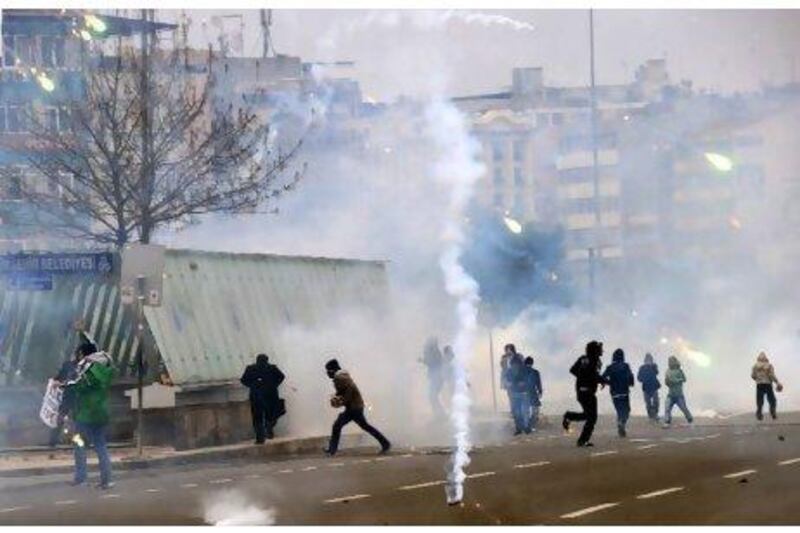ISTANBUL // The credibility of Turkey's upcoming parliamentary elections has been damaged after the electoral commission in Ankara excluded leading Kurdish politicians from standing as deputies.
"This is not a decision that can be tolerated by a democratic conscience," Mehmet Ali Sahin, the speaker of parliament, said on Tuesday. "This decision has weakened the mission of parliament." Mr Sahin called on the High Electoral Council, or YSK, the independent body charged with organising the elections on June 12, to review its decision. Politicians of all stripes also criticised the election board for what they said was an undemocratic decision; some called the ruling a "shame".
In a surprise move, the YSK decided late Monday to cancel the candidacies of seven prominent Kurdish politicians. Among them is Leyla Zana, a former Kurdish deputy who spent 10 years in prison for speaking Kurdish in parliament and who received a human rights award from the European parliament.
Turkey's main Kurdish party, the Party for Peace and Democracy, or BDP, condemned the decision as a step to keep Kurds out of parliament and to make sure the ruling Justice and Development Party, or AKP, would win the most seats in the Kurdish south-east. "It is an operation to leave the region to the AKP," said Selahattin Demirtas, a BDP leader. The AKP denied the accusation.
The YSK is made up of judges from Turkey's court of appeals and top administrative court, institutions known as sceptical of the government.
BDP officials said they were pondering their next steps. Mr Demirtas said a recall of all Kurdish candidates and boycott of the elections by Kurds were possible. Other BDP officials said the decision could trigger renewed clashes in the Kurdish region, where Kurdish rebels have been observing a cease-fire since last year that is to last at least until the June elections.
Tens of thousands of people have died in a guerilla war between rebels of the Kurdistan Workers' Party, or PKK, and the Turkish military since fighting began in 1984.
"This decision has been drawn up to provoke new violence," said Sirri Sakik, a BDP deputy. "This is a decision for war," said the main headline of the pro-Kurdish newspaper Ozgur Gundem on Tuesday.
Following the YSK decision, Kurdish protesters clashed with security forces in the predominantly Kurdish provinces of Van and Hakkari, news reports said. Protesters shouted "Revenge, revenge", and "Down with the AKP", according to the reports. Police used tear gas and water cannons to disperse the crowds. BDP supporters also clashed with police in Istanbul, which is home to a sizeable Kurdish community.
An election boycott by the BDP would be a major setback for efforts to solve the Kurdish question peacefully. Recep Tayyip Erdogan, the prime minister and AKP leader, said he wants to end the 27-year conflict by giving Kurds more rights and jobs and by convincing the PKK to lay down its arms. Many of Turkey's 12 million Kurds say they are victims of discrimination. The YSK's decision is likely to strengthen that feeling.
The step taken by the election body could also weaken Turkey's bid to fulfil political conditions to become a member of the European Union. The EU has frequently criticised Turkey for failing to provide Kurds with equal rights.
The YSK said Ms Zana and the others were not eligible to stand for parliamentary seats because of former prison sentences handed down against them. But BDP officials said two of their current parliamentary deputies had been banned from running this time, though there had been no objections to their candidacies before 2007 elections. Other deputies who have spent time behind bars, including Mr Erdogan himself, who was jailed for inciting religious hatred in 1998, have not been blocked by the YSK.
By having Ms Zana and the other Kurdish candidates run as nominally independent candidates, the BDP was hoping to circumvent a rule that says a party needs at least 10 per cent of the nationwide vote to get seats in parliament. That strategy has now received a serious blow. According to news reports on Tuesday, the party did not name enough substitute candidates who could take the place of the politicians banned by the YSK.
Kemal Kilicdaroglu, the opposition leader in Ankara, on Tuesday called for an emergency session of parliament to pass a law lowering the 10 per cent threshold in an effort to enable the BDP to re-enter parliament after June 12. Mr Erdogan's government did not comment on the proposal.
tseibert@thantional.ae






